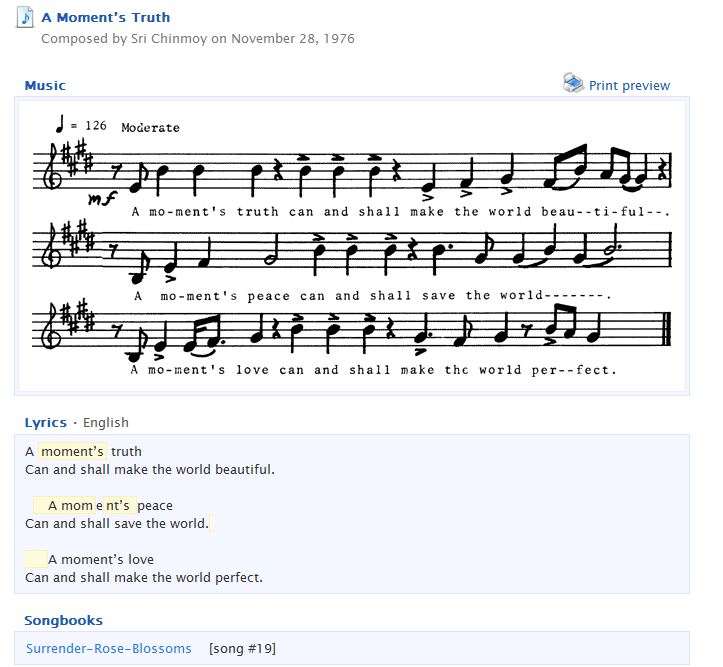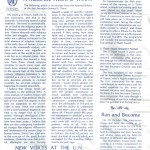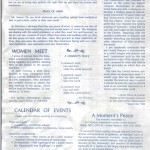A Moment’s Peace – Newsletter AMP/1982-02 September 1982
Filed under Moments peace - Update Pub & ArchiveContent Highlights:
A MESSAGE FROM U THANT – excerpt from the farewell address of the late Secretary-General U Thant.
U THANT ISLAND – To commemorate the fifth anniversary of the naming of U Thant Island, a simple but striking arch has been placed on this small island
U Thant Award Recipient – given to an individual in the international
community who exemplifies through his efforts toward world peace the spiritual values for which the late Secretary-General was well known . The first recipient of the Award: Ambassador Zennon Rossides of Cyprus, who is highly respected in the U.N. community .
Run and Become. 10 October the Meditation Group will hold the fourth in an
ongoing series of races for the U.N. community. A one-mile run will be held for delegates and their families and shorter races will be held for children in different age groups.
NEW VOICES AT THE U.N. All are cordially invited to attend
- the music concert on 14 September hosted by Ambassador Davidson L. Hepburn of the Bahamas.
- 12 October PROGRAMME, WITH AMBASSADOR ZENON ROSSIDES OF CYPRUS SERVING AS HONOURARY HOST, Will be DEDICATED TO ORIGINAL POETRY AND PROSE.
Questions on Meditation: POLITICS AND MEDITATION; PEACE OF MIND
WOMEN MEET – women from the diplomatic community have begun meditating together at a weekly meeting held in the homes of the group’s members.
POEM – SONG “A moments truth…peace…love.” Music score and listen to audio recording.
UN Today: – Javier Perez de Cuellar; Excerpt from the Report of the Secretary-General on the work of the Organization, 7 September 1982
– – – – – – – – – – – – – – Details Below – – – – – – – – – – – – – – – – – – – – – –
A MESSAGE FROM U THANT –The following article is an excerpt from the farewell address of the late Secretary-General U Thant.
My reading of history leads me to one conclusion, and that is that humanity is marching toward a great synthesis. The trend is unmistakable. Let us look at the religious aspect of the human situation throughout history. History abounds .with religious strifes and struggles. War and crusades are a glaring testimony to the total absence of religious tolerance in the early days of history. Even as late as the nineteenth century, religious tolerance was regarded in many parts of the world as not only a sin but as a colossal crime. However, humanity has moved a long way from those closed religious societies to much more open and much more tolerant societies. Now in the second half of the twentieth century, religious tolerance is not regarded as a sin or a crime but as a very desirable attitude in civilised societies. So, all great religions are beginning to coexist peacefully.
I believe that similar trends are noticeable in the political field. A close analysis of modern history will reveal one fact: that political ideologies are not static but organic in that they are adaptable to the vicissitudes of time. What one considers to be a fixed political dogma at one time is no longer true at a later period. Although ideological differences and intolerance from time to time have been acute, I believe that they are also undergoing fundamental changes like religious differences and intolerance of a certain stage in human history. Since I am a believer in the concept of the great human synthesis, I hold the view that political ideologies are also moving toward it state of peaceful coexistence in the same way as religious beliefs are. This process may take a long time, perhaps several generations, but the trend is unmistakable.
I have always believed that efforts to achieve a better world can only succeed if they spring from deep faith and a strong moral and spiritual commitment to the basic principles of love, compassion and understanding which are the foundation of all the great religions. I have certain priorities in regard to virtues and human values. As far as I am concerned, an ideal man or an ideal woman, is one who is endowed with four attributes, four qualities: physical qualities, intellectual qualities, moral qualities and spiritual qualities. Of course it is very rare to find a human being who is endowed with all these qualities but, as far as priorities are concerned,
I would attach greater importance to intellectual qualities over physical qualities. I would attach still greater importance to moral qualities over intellectual qualities-moral qualities, like love, compassion, understanding, tolerance, the philosophy of live and let live, and the ability to understand the other man’s point of view. And above all, I would attach the greatest importance to spiritual qualities, like faith in oneself and the purity of one’s inner self, which to me is the greatest virtue of all . With this approach, with this philosophy, with this concept alone, we will be able to fashion the kind of society we want, the kind of society which was envisaged by the founding fathers twenty-six years ago.
U THANT ISLAND – To commemorate the fifth anniversary of the naming of U Thant Island, a simple but striking arch has been placed on this small island facing the United Nations in the East River.
A ceremony to mark the event will take place on 5 October in a conference room facing the island. All members of delegations are cordially invited to attend, and those wishing to offer a tribute to the late Secretary-General are kindly requested to call. The programme will include the presentation of the first annual U Thant Award.
U Thant Award Recipient – given to an individual in the international
community who exemplifies through his efforts toward world peace the spiritual values for which the late Secretary-General was well known.
The first recipient of the Award: Ambassador Zennon Rossides of Cyprus, who is highly respected in the U.N. community for his deep commitment to world peace and his noted expertise in the areas of national security and disarmament.
He shares the late Secretary-General’s deep conviction that only through a strengthening of spiritual values can there be genuine and lasting peace. .
Run and Become. 10 October the Meditation Group will hold the fourth in an ongoing series of races for the U.N. community.
A one-mile run will be held for delegates and their families and shorter races will be held for children in different age groups.
The Meditation Group feels that running is a fitting complement to • meditation in that it energises the outer life as the practice of meditation energises the inner life. The philosophy of the Group in this endeavour, emphasising the spiritual component in athletics, is: “Run and become, become and run”.
The races will take place on the public plaza at the Visitors’ Entrance to the U.N. The children’s races will start at 8:30 a.m. and the adult race will start at 9:00 a.m. Registration will be held for a half hour before each race .
Bring your family and join us for these runs, which are great fun for all
NEW VOICES AT THE U.N.
Since man’s most progressive and humanitarian impulses often find their first expression in the arts, the Meditation Group is planning a series of programmes this fall to support and nurture artistic ideals among members of the diplomatic community. In this connection we are sponsoring special events in which delegates will offer expressions of their national or individual talents in music, art and literature.
All are cordially invited to attend
- the music concert on 14 September hosted by Ambassador Davidson L. Hepburn of the Bahamas.
- 12 October PROGRAMME, WITH AMBASSADOR ZENON ROSSIDES OF CYPRUS SERVING AS HONOURARY HOST, WILL BE DEDICATED TO ORIGINAL POETRY AND PROSE. Participating delegates will have their recitations published in a special volume to commemorate the occasion.
Questions on Meditation:
POLITICS AND MEDITATION
Mr. Brian Saxton, U.N. correspondent for BBC: The United Nations is, of course, a very political place. How is politics related to meditation?
Sri Chinmoy: We feel that politics can be illumined and raised to a very high state of consciousness so that humanity can be transformed, illumined and fulfilled. We pray and meditate to purify our mind. Once our mind is purified and illumined, then this mind of ours-which creates so many problems for us, which constantly creates confusion, doubt, worries and anxieties-will become a perfect instrument for us to use to have a better world or, we can say, to bring to the fore a new face of the world. We do not use politics as such, but we try to bring into politics the light that we get from our prayer and meditation.
PEACE OF MIND
Mr. Saxton: Do you think diplomats gain anything special from meditation that is particularly useful to their own work?
Sri Chinmoy: I do hope that they get peace of mind. It seems to me that all human beings have everything save and except peace of mind. The delegates are dealing with the world problems, so what they need first and foremost, as far as I can see, is peace of mind. When they come and meditate with us, they do feel peace of mind. And then, when they go back to their respective offices, they can solve the problems that they have been facing with new light, new inspiration, new aspiration and new illumination.
WOMEN MEET – A group of women from the diplomatic community have begun meditating together at a weekly meeting held in the homes of the group’s members.
At each meeting, a short introduction to basic meditation techniques is given, followed by a period of silent meditation. New members are cordially invited to attend the next meeting of the group, which will be held on Wednesday, 22 September at 12 noon. For further information, please call Ms. Carol R. Tooker.
POEM – SONG “A moments truth…peace…love.”
A moment’s truth
Can and shall
Make the world beautiful.
A moment’s peace
Can and shall
Save the world .
A moment’s love
Can and shall
Make the world perfect.
-Sri Chinmoy
Listen to Audio recording: 17 A Moment’s Truth
UN Today: – Javier Perez de Cuellar; Excerpt from the Report of the Secretary-General on the work of the Organization, 7 September 1982
The United Nations is now 37 years old. It has survived a period of unprecedented change in almost all aspects of human life. The world of 1982 is vastly different from that of 1945, and that difference is reflected in the United Nations. In other words, the Organization has had to adapt to new circumstances to a quite unexpected extent. But it is not enough for the United Nations merely to reflect change or conflict. The Organization was intended to present to the world the highest common denominator of international behaviour and, in doing so, to develop a binding sense of international community. It was to that end that Governments drafted and ratified the Charter. Amid the various perils that now threaten the orderly progress of humanity, I hope that we can rally once again to the standards of the Charter, beginning with the peaceful settlement of disputes and steadily branching out towards the other objectives of that prophetic document….
I am absolutely convinced that the United Nations is indispensable in a world fraught with tension and peril. Institutions such as this are not built in a day. They require constant constructive work and fidelity to the principles on which they are based.
We take the United Nations seriously when we desperately need it. I would urge that we also seriously consider the practical ways in which it should develop its capacity and be used as an essential institution in a _ stormy and uncertain world.
CALENDAR OF EVENTS – Please confirm all scheduling.
Ongoing events
- Introductory meditation classes
- Silent meditations led by Sri Chinmoy, twice weekly
September programmes
- 14 September-“New Voices at the United Nations” ~-~ musical concerrby members-of “delegation
- 20 September- The Opening of the General Assembly: Opportunity and Challenge”-a forum
October programmes
- 5 October-U Thant Island commemoration and award presentation
- 10 October-One-mile runs for delegates and families
- 12 October-“New Voices at the United Nations”a forum for original poetry by members of delegations
- 22 October-Symposium commemorating U.N. Day
- 29 October-Programme for Universal Children’s Day
November programmes
- Thanksgiving through many cultures
- “New Voices at the United Nations” -an exhibition of fine art, sculpture and photographic works by members of delegations
- Twenty-fifth anniversary of the redesign of Meditation Room at at the U.N.
A Moment’s Peace aspires, through selected interviews, articles and summaries of speeches, to highJight many of the progressive viewpoints currently being discussed or considered at the United Nations. Part of each issue is devoted to the philosophy and practice of meditation, especially as it applies to the larger concerns that govern
our lives at the United Nations.
Download a PDF-OCR text format mg-amp-1982-02-ocr
Page images:
- mg-amp-1982-02-ocr_masthead.jpg 110 KB
This information is presented as a service and does not necessarily represent the official views of the United Nations or its Agencies.
This information is presented as a service and does not necessarily represent the official views of the United Nations or its Agencies.




